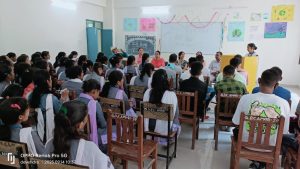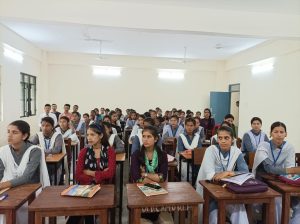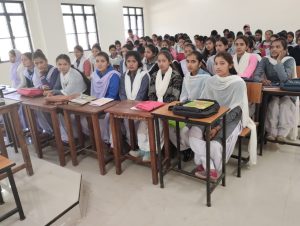Teaching Plan/COs/POs/PSOs
Rajkiya Mahavidyalaya Amori (Champawat)

| Course Outcomes (COs), Programme Outcomes (Pos) and Programme Specific Outcomes (PSOs) |
- COs define the learning expectations for individual courses.
- POs outline the skills and competencies expected upon graduation from the overall program.
- PSOs specify unique outcomes that relate to particular specializations or concentrations within a program.
- Course Outcomes (COs) : Course Outcomes are specific goals that outline what students are expected to achieve by the end of a particular course. They provide a clear framework for both teaching and learning, articulating the skills, knowledge, and competencies that students should demonstrate upon successful completion of the course.
- Hindi: In the Hindi courses, students will be able to analyze and interpret contemporary Hindi literature, enhancing their understanding of current literary trends and styles. Additionally, they will discuss the cultural and historical context of major Hindi literary works, developing a deeper appreciation for the socio-political influences that shape literature in Hindi.
- English: English students will critically evaluate different genres of English literature, gaining insights into the distinct characteristics and themes of each genre. They will also be tasked with writing analytical essays on literary texts, employing appropriate theoretical frameworks to support their analyses, thereby honing their critical thinking and writing skills.
- Sanskrit: Students in Sanskrit courses will learn to translate and interpret classical Sanskrit texts, facilitating their engagement with ancient literature. They will also analyze the influence of Sanskrit literature on Indian culture and philosophy, allowing them to appreciate its significant contributions to the intellectual fabric of India.
- Economics: In Economics courses, students will analyze economic data using various statistical tools, equipping them with the skills needed to interpret quantitative information effectively. They will also apply economic theory to real-world issues and policymaking, preparing them to make informed analyses of economic phenomena.
- History: History students will analyze historical events and their implications through primary and secondary sources, fostering their research abilities and critical engagement with historical narratives. Additionally, they will compare different historical interpretations of major global events, enhancing their ability to understand the complexity of history.
- Political Science: In Political Science courses, students will assess the role of institutions in shaping political behavior and policy, enabling them to understand the dynamics of governance. They will also engage in debates on contemporary political issues using theoretical frameworks, fostering their analytical and argumentative skills.
- Education: Students in Education courses will analyze educational theories and their applications in classroom settings, providing them with the theoretical underpinning for effective teaching practices. They will also develop lesson plans that incorporate diverse teaching methods, equipping them to address various learning styles and needs in the classroom.

- Programme Outcomes (POs) : Graduates from the B.A. program will possess effective communication skills in their respective languages, enabling them to articulate ideas clearly and persuasively. They will demonstrate critical thinking and analytical abilities, allowing them to approach complex topics with a keen and informed perspective. This comprehensive understanding of their subject matter ensures that graduates are well-prepared for both professional practice and further studies in the diverse fields of arts and humanities.
- Hindi: Graduates will communicate effectively in Hindi, demonstrating proficiency in both written and spoken forms. They will show a deep understanding of the evolution of the Hindi language, including its various dialects, which contributes to their linguistic versatility. Additionally, graduates will be skilled in analyzing diverse forms of Hindi literature, contextualizing these works within cultural and historical frameworks to appreciate their significance.
- English: Graduates will exhibit proficiency in academic and creative writing in English, equipping them with the necessary skills for diverse communication contexts. Strong oral and written communication abilities will enable them to express ideas clearly and persuasively. Furthermore, they will critically analyze and interpret different genres of English literature, applying relevant theoretical frameworks to enhance their understanding of texts.
- Sanskrit: Graduates will understand the complexities of Sanskrit grammar and linguistics, allowing them to navigate classical texts with ease. They will engage in scholarly research, demonstrating an ability to analyze ancient texts and their relevance. Additionally, graduates will explore the influence of Sanskrit literature on Indian culture and philosophy, deepening their appreciation for this rich intellectual heritage.
- Economics: Graduates will critically assess economic policies and their societal impacts, equipping them with the ability to make informed judgments about economic issues. Strong quantitative and qualitative analytical skills will be developed, enabling them to interpret data effectively. Graduates will also apply economic theory to real-world issues and policymaking, utilizing statistical tools to analyze economic data comprehensively.
- History: Graduates will be capable of conducting independent research on historical topics, developing a strong foundation in historical methodologies and historiography. This capability will allow them to approach historical events with a critical lens. Additionally, they will analyze historical events and their implications using primary and secondary sources effectively, enriching their understanding of the past.
- Political Science: Graduates will grasp major political theories as well as their practical applications in contemporary governance. Essential research skills, including both quantitative and qualitative analysis of political data, will be part of their training. Graduates will also assess the role of political institutions in shaping behavior and policy, providing them with insights into the dynamics of political systems.
- Education: Graduates will be equipped to address diverse educational needs and learning styles, making them effective educators and facilitators. They will demonstrate effective communication skills for interacting positively with students, parents, and colleagues. Moreover, graduates will analyze educational theories and apply these insights in classroom settings, contributing to an inclusive and responsive educational environment.

- Programme Specific Outcomes (PSOs) : Definition: Programme Specific Outcomes that focus on the unique aspects of a particular program within the broader educational framework. PSOs align closely with the objectives of a specific discipline or concentration within the arts, highlighting the specialized knowledge and skills that students should acquire. PSOs define the specific skills and knowledge that students should acquire in their respective disciplines within the Bachelor of Arts program. PSOs prepare students for professional practice, further education, or civic engagement by emphasizing specialized competencies in their chosen fields.
- Hindi Literature : Demonstrate an in-depth understanding of major themes, literary forms, and historical movements in Hindi literature. Engage in critical analysis and interpretation of classical and contemporary Hindi texts, contributing to scholarly discourse.
- English Literature: Develop proficiency in applying literary theories to analyze texts from various genres and historical contexts. Create original literary works and develop skills in writing critiques and analyses that reflect an understanding of narrative techniques.
- Sanskrit: Conduct textual analysis and interpretation of classical Sanskrit literature while understanding its cultural and philosophical contexts. Engage in comparative studies with texts from other ancient civilizations, drawing connections and insights.
- Economics: Apply economic theories and analytical tools to evaluate socio-economic issues and policies at local, national, and global levels. Conduct independent research on economic topics, demonstrating the ability to synthesize data and draw informed conclusions.
- History: Specialize in a specific geographical region or historical period, demonstrating the ability to conduct original research that contributes to historical understanding. Analyze primary and secondary sources to construct well-supported historical narratives and arguments.
- Political Science: Develop a comprehensive understanding of political institutions, theories, and behaviors, applying this knowledge to current political issues. Design and evaluate research projects that assess the impact of policies and governance on societal outcomes.
- Education: Formulate educational resources and conduct practical teaching demonstrations that reflect diverse pedagogical approaches. Assess and address the individual learning needs of students through tailored educational strategies and frameworks.
Here Subject and Semester wise Teaching Plan/COs/POs/PSOs are given here. please click as per needed
| S.NO. | Teaching Plan | NEP |
| 1 | Sanskrit | Sanskrit- NEP |
| 2 | Hindi | Hindi NEP |
| 3 | English Literature | English Literature (NEP) |
| 4 | Political Science OLD TP | Political-Science-NEP |
| 5 | Education | Education (NEP) |
| 6 | Economics : Old Policy | ECONOMICS- NEP |
| 7 | History TAP (Old) | History-NEP |
